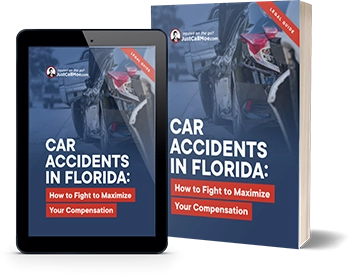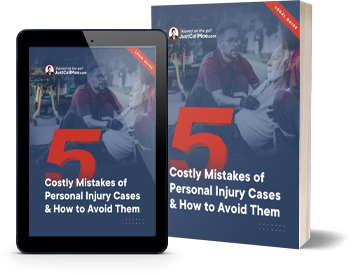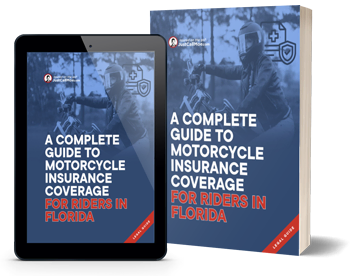Motorcycle enthusiasts know the thrill and freedom that comes with riding on the open road. However, when another motorist fails to look out for motorcycles, the damage can be severe. One of the most devastating injuries we see from motorcycle accidents is the traumatic brain injury (TBI). A traumatic brain injury is different from other physical injuries. A TBI may often be invisible. While other injuries display scars and disfigurement, a traumatic brain injury may show no visible external injuries. Unfortunately, the internal damage to the brain can have life altering consequences. It is important to understand both the causes and the symptoms to properly identify and diagnose a traumatic brain injury as they are often misunderstood.
What is a Traumatic Brain Injury?
A traumatic brain injury, commonly known as TBI, is a brain dysfunction caused by a blunt impact or external force. This impact can result from a direct hit to the head, such as when a motorcyclist’s head hits the pavement or another vehicle, or from the violent shaking of the head, as seen in whiplash. A traumatic brain injury comes in all shapes and sizes. While the most severe TBI injuries may result in complete loss of function, other less severe TBI injuries may result in persistent headaches or other lifelong pain that may not be noticeable by the outside world.
Causes of TBI in Motorcycle Accidents
While numerous scenarios can result in a TBI during a motorcycle crash, some of the most common include:
- Collision with a larger vehicle, especially at high speeds.
- Being thrown off the motorcycle and landing head-first.
- The motorcyclist’s head being struck by debris or other objects.
- Helmet malfunction or not wearing a helmet at all.
- Sudden jolt of the head or neck
- Head making contact with the pavement
Symptoms of TBI
The symptoms of TBI can range from mild to severe and can manifest physically, cognitively, and emotionally. Some common symptoms include:
- Persistent headaches or neck pain.
- Difficulty in concentrating, remembering, or making decisions.
- Slurred speech and blurred vision.
- Nausea or vomiting.
- Mood swings, depression, or feelings of anxiousness.
- Fatigue or lethargy.
- Difficulty remembering things
Diagnosing a TBI
Diagnosing a Traumatic Brain Injury (TBI) after a motorcycle accident involves a thorough and systematic assessment by healthcare professionals. Here are the key steps typically involved in the diagnostic process:
- Clinical Evaluation: Healthcare providers will conduct a comprehensive clinical evaluation, assessing the patient’s medical history, symptoms, and the circumstances of the motorcycle accident. Information about the impact, loss of consciousness, and post-accident amnesia is particularly important.
- Neurological Examination: A detailed neurological examination is conducted to evaluate cognitive function, sensory responses, motor skills, reflexes, and coordination. Any abnormalities may indicate potential brain injury.
- Imaging Studies: Neuroimaging studies are often employed to visualize the brain and identify structural abnormalities. Common imaging techniques include:
- CT Scan (Computed Tomography): Useful for detecting acute injuries, bleeding, and fractures.
- MRI (Magnetic Resonance Imaging): Provides detailed images of the brain’s structures, helping to identify more subtle injuries.
- Glasgow Coma Scale (GCS): The GCS is a standardized scale used to assess a patient’s level of consciousness and neurological functioning. It helps categorize the severity of a TBI based on eye, motor, and verbal responses.
- Cognitive and Neuropsychological Testing: Specific neuropsychological tests may be administered to evaluate cognitive function, memory, attention, and executive function. These tests help identify subtle cognitive impairments that may result from a TBI.
- Symptom Assessment: Evaluating and monitoring the patient’s symptoms, including headaches, nausea, dizziness, memory problems, and changes in behavior, is an integral part of the diagnostic process.
It’s important to note that the diagnosis of a TBI is often an effort that involves emergency medical personnel, neurologists, radiologists, and other healthcare professionals. Early and accurate diagnosis is crucial for initiating appropriate treatment and rehabilitation strategies.
The Role of Helmets
Helmets play a critical role in helping to reduce the risk of TBI during motorcycle accidents. While helmets do not provide complete protection, helmets are able to absorb much of the impact force and help distribute it away from the skull. According to the National Highway Traffic Safety Administration (NHTSA), helmets reduce the risk of head injury by 69% and the risk of death by 37%.
Treatment and Recovery
The treatment for TBI primarily depends on the severity of the injury. Mild TBIs may require rest, therapy, and over-the-counter pain relievers, while more severe TBIs might necessitate surgery, rehabilitation, and long-term care. Recovery is a multidisciplinary effort involving neurologists, physiotherapists, occupational therapists, and psychologists. Early intervention is key, as is ongoing support from both medical professionals and loved ones.
The Long-Term Impact of TBI
Even after recovery, individuals who’ve suffered from a TBI may experience lasting effects. These can include chronic pain, sleep disorders, personality changes, and sensitivity to light or sound. Moreover, TBI has been linked to an increased risk of certain neurological diseases, such as Alzheimer’s and Parkinson’s.
Traumatic brain injuries caused by motorcycle crashes can dramatically alter the course of one’s life. While prevention, in the form of safe riding practices and helmet usage, remains the best strategy, understanding the nature and implications of TBI can better prepare riders and their families to face such challenges head-on. Safe riding and early medical intervention can make all the difference in the aftermath of such a traumatic event.
Contact us at JustCallMoe Injury and Accident Attorney today for help from an experienced motorcycle accident lawyer.

 (866) 225-5663
(866) 225-5663




 100% Secure and Confidential
100% Secure and Confidential